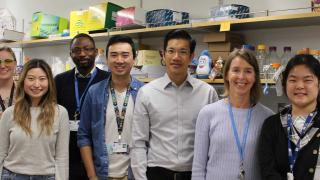
Leo Wang Lab
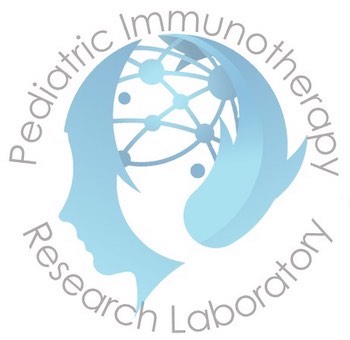
Our laboratory takes a truly translational approach to improving cellular therapies for pediatric cancers. We use protein-focused techniques to understand how cancer-targeting engineered immune cells make cell state and fate decisions, and use that information to design improved adoptive cellular therapies.
Combined with in vitro and in vivo model systems, these strategies will enable us to understand and to treat pediatric blood cancers and solid tumors more effectively.
Clinical Trials
We recently launched a new clinical trial using chimeric antigen receptor (CAR) T cells to treat pediatric patients (ages 4-25) with recurrent and refractory brain tumors.
Children with aggressive brain tumors have a very poor prognosis and new therapies are badly needed. Researchers at City of Hope have developed a promising new CAR T cell therapy that has shown remarkable clinical efficacy (Brown et al., NEJM 2016), and we are excited that our clinical trial will extend this therapy to children with neuromalignancies including (but not limited to) glioblastoma, medulloblastoma, atypical teratoid/rhabdoid tumor, ependymoma, and diffuse midline glioma/DIPG.
Our trial uses lymphodepletion followed by autologous CAR T cells that target the brain tumor antigen IL13Rα2, after an initial safety lead-in in which patients will receive CAR T cells without lymphodepletion. For more information, please call 833-582-4673 (833-582-HOPE) or email PediatricTrials@coh.org.
An Associate Professor in the Department of Immuno-Oncology and the Department of Pediatrics, Dr. Leo Wang researches CAR T research, hematopoietic stem and progenitor cell biology, and immune cell signaling and engineering.
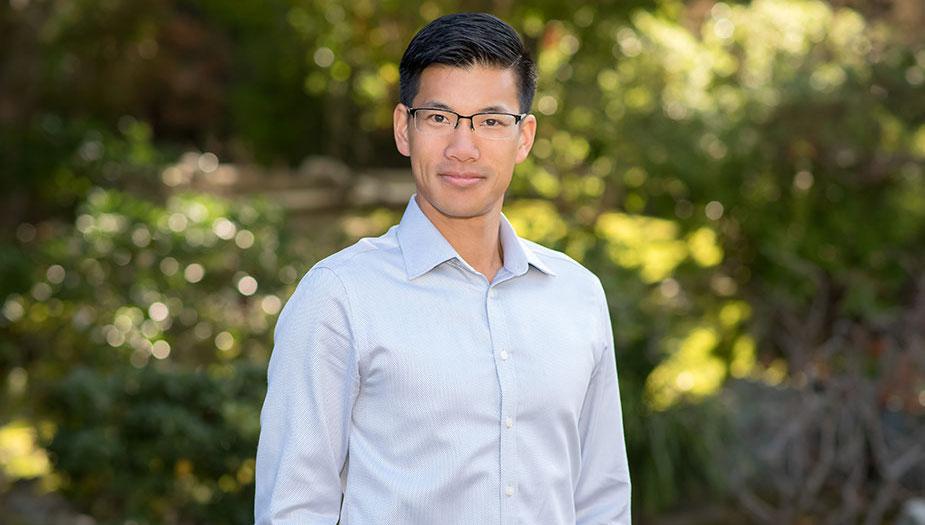
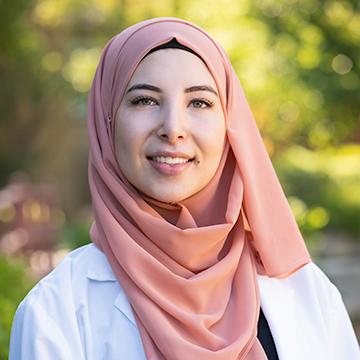

Nour Amwas completed her undergraduate degree in biology with a chemistry minor from Al-Quds Bard College in 2019. Shortly after, she joined the Neuroscience research team at An-Najah University to study potential pharmacological drugs targeting α-amino-3-hydroxy-5-methyl-4-isoxazolepropionic acid receptor (AMPAR). When she enrolled into Arab American University’s Molecular Genetic and Genetic Toxicology Master program, she dedicated herself to defining the epigenetic modifications associated with insulin resistance. Nour is currently a graduate student at City of Hope's Irell & Manella Graduate School of Biological Sciences. Under the guidance of Leo Wang, M.D., Ph.D., Nour’s dissertation research will explore the immuno-cross talk between CAR T and TCR in the context of cancer immunotherapy.
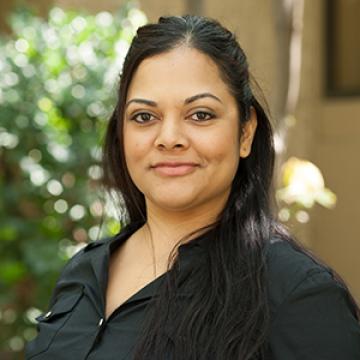

Supriya Bautista is a Research Operations Analyst in Dr. Leo Wang's Lab at the Beckman Research Institute ar City of Hope.
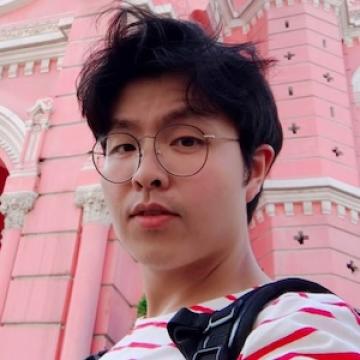

Victor Chiu embarked on his academic journey by pursuing a Master of Science degree at National Yang Ming Chiao Tung University, Taiwan, in 2016. Under the guidance of Dr. Chen, Joanne Jeou-Yuan, his master's thesis delved into the role of glycol-modification in serglycin-mediated malignant phenotypes. Subsequently, he earned his Ph.D. from the laboratory of Dr. Chang, Yi-Cheng, at National Taiwan University and Academia Sinica, Taiwan, in 2023. His doctoral research focused on RRBP1 and its regulation of blood pressure and potassium homeostasis by modulating intracellular renin trafficking. Currently, Victor has joined the laboratory of Leo Wang, M.D., Ph.D. as a postdoc. In this role, he is dedicated to studying the crosstalk between TCR and CAR. His primary goal is to uncover an optimal approach for the treatment of cancer.
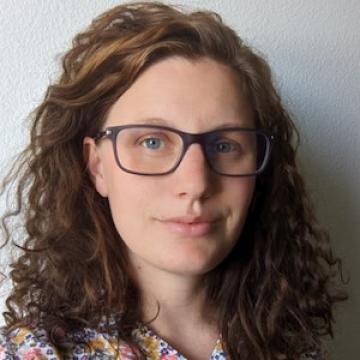

Diana Gumber graduated with a Bachelor of Science from California Polytechnic State University, San Luis Obispo in 2015, double majoring in animal science and biology. In 2017, she earned her Master of Science in agriculture with a specialization in animal science from the CIRM-funded Regenerative Medicine program at Cal Poly. Upon graduation, she joined the laboratory of Karl Willert, Ph.D., at the University of California, San Diego, which studies the role of Wnt proteins and their signaling pathways in cancer and development. As a graduate student of City of Hope's Irell & Manella Graduate School of Biological Sciences, she is excited to begin her dissertation research in the laboratory of Leo Wang, M.D., Ph.D., in the study of hematopoietic malignancies and cancer immunotherapies.
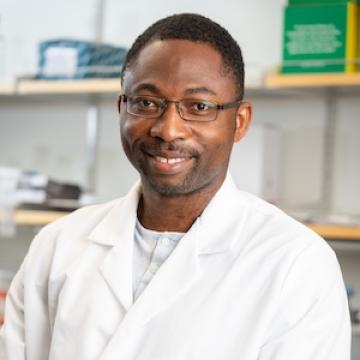

In 2008, Leonce Kouakanou, Ph.D., graduated from the University of Abomey-Calavi in Benin with a Bachelor's in physiology. In 2011, he completed his M.Sc. in microbiology/immunology at the University of Lome, Togo. He completed his master's thesis, which focused on the immunoregulation by antibodies in infant malaria, at the Medical Research Council in the U.K, The Gambia. With a Ph.D. scholarship from the German Academic Exchange Service, he joined the University of Kiel in Germany in the group of Professor Dieter Kabelitz in 2015. He obtained his Ph.D. in Immunology in 2019, working on the influence of vitamin C in the differentiation and functional plasticity of human gamma delta T cells, in the context of cancer immunotherapy. In Leo Wang's lab, he is interested in testing the role of small molecules in modulating the differentiation, survival, and antitumor functions of CAR T cells.


Emily Maylish is a researcher in Dr. Leo Wang's Lab at the Beckman Research Institute at City of Hope.
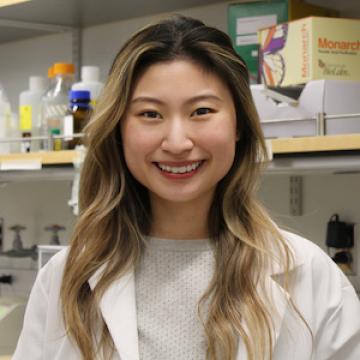

Grace Sun received her bachelor's degree in animal science from California State Polytechnic University, Pomona in 2020. She then continued her education at the University of Southern California, earning a Master of Science in stem cell biology and regenerative medicine in 2021. During her time at USC, she conducted research in the laboratory of Miller Huang, Ph.D., where she studied the molecular mechanisms of the MYCN pathway in medulloblastoma and its effect on tumorigenesis. Sun is excited to explore the clinical and translational aspects of research and the field of immuno-oncology in the lab of Dr. Wang.
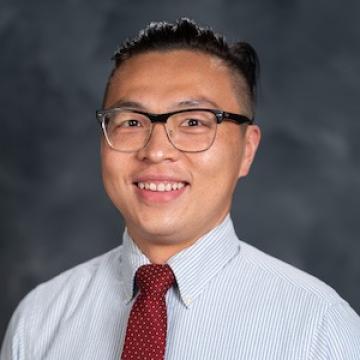

Hanmin Wang graduated from the Beijing University of Chinese Medicine in 2013 with a bachelor’s degree in biopharmaceutical engineering and then completed his Ph.D. in physiology at Loma Linda University in 2021. His previous research interests include cell fate decisions and the actions of transcription factors and miRNAs in development and cancer.
He finished his Ph.D. project in the laboratory of Dr. Juli Unternaehrer at Loma Linda University. There, Hanmin studied the role of transcription factor SNAIL and miRNA let-7 in the context of cancer cell stemness. Hanmin joined the laboratory of Dr. Leo Wang as a postdoctoral fellow and is eager to start the next chapter of his career and expand his horizons in the pursuit of cancer patient health.
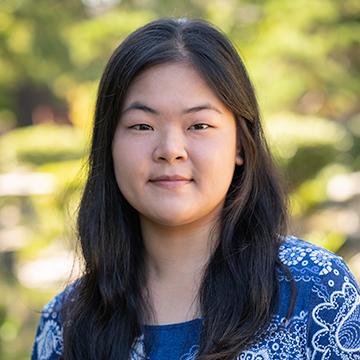

Melody Wu graduated from the Massachusetts Institute of Technology in 2022 with a bachelor's degree in biological engineering. At MIT, she researched the migration of neutrophil-like cells through chemokine secretion as part of the 2019 iGEM team in the Weiss Lab and Synthetic Biology Center. She then worked in the Shalek Lab, focusing on research in immunology and microfluidics for developing spatial-omic technology for single-cell RNA sequencing. Melody joined the lab of Dr. Leo Wang here at City of Hope in 2022 and is excited to explore translational and clinical research in immuno-oncology to improve immunotherapies for patients.
Lab Alumni
- Tristan Chan
- Marly Coe
- Martha Gomez-Knight
- Nathan Hendricks, Ph.D.
- Stephanie Huard
- Sadie Johnson, Ph.D.
- Silke Lindner, Ph.D.
- Antigoni Manousopoulou , M.D., Ph.D.
- MeiLu McDermott
- Chris Meeks
- Angelica Quijada
- Shilpa Shahani, M.D.
- Jennifer Shepphird, Ph.D.
- Summer Singh
- Rajiv Tiwari, Ph.D.
- Kyla Woshner
- Matthew Yap
Pediatric cancer research is woefully underfunded; only 4 percent of the National Cancer Institute's budget goes towards this critically important work. We rely on support from foundations and other philanthropic sources to keep our lab running and to continue our work to find cures for pediatric brain and blood cancers. We thank our wonderful donors for their past, current, and future support.
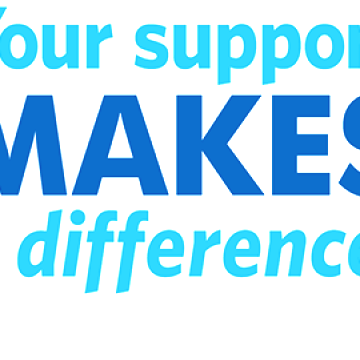
Current Support
- CIRM (California Institute for Regenerative Medicine)
- The V Foundation
- The Kure It Foundation
- The Turtle Pond Foundation
- Anonymous
Previous Partners
- Gabrielle's Angel Foundation
- The Andrew McDonough B+ Foundation
- St. Baldrick's Foundation
- STOP Cancer Foundation
- Alex's Lemonade Stand Foundation for Childhood Cancer
- Damon Runyon Cancer Research Foundation
- Hyundai Hope on Wheels
- Margaret E. Early Medical Research Trust
- Pediatric Cancer Research Foundation
- National Cancer Institute
The City of Hope Alpha Stem Cell Clinic is a novel program dedicated to the rapid research and development of stem cell-based therapies for cancer, HIV/AIDS, sickle cell disease and other illnesses.
Latest Research News
No articles found matching the selected criteria.
34.1293409, -117.971358
Duarte, CA 91010